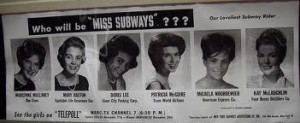“This poster can make you happier than any other on the subway.”
So reads an ad for the School of Practical Philosophy that graces the occasional NYC subway car. The problem is, it just doesn’t make me happy. It presses all my buttons, has me reaching for my red pen, and makes me think I’m a subway poster, which I don’t think I am.
If I’m supposed to be happier than “any other”, I ask myself this: than any other what? Than any other poster on the subway? Well, I’m posting on this blog, which makes me a poster, and I am on the subway (at least when I’m reading the ad), so I guess I’m another poster on the subway. But I don’t think that’s what the School of Practical Philosophy is getting at. Or maybe it is.
Perhaps it’s trying to say that the poster can make me happier than any other poster can. Ah: but then why leave out the can? Perhaps because it suggests a can of posters?
Can the School of Practical Philosophy possibly mean that its ad can make me happier than any other human – or reader, or thinker, or philosopher, or nit-picker – on the subway? But what happens when I resurface from the belly of the earth, blinking in the hot sunlight. Will I still be happy?


I usually presume marketing people look at slogans from such a specific point of view that they simply can’t see what we outsiders notice. But in this case, I hoped that the School made a deliberate choice for ambiguity as a subtle invitation to the educational process of inquiry. Where would that apply more than in philosophy? (I’m hoping for too much, right?)
Yes – I think you’re hoping for too much, Jeff! I’m sure such subtlety would fly way over the heads of most subway riders (no offense to my fellow New Yorkers), and probably over those of most advertising copy-writers too. But it’s fun to wonder whether they’re cleverer than we think.
The OED’s definition 9b of ‘other’ is ‘A person other than oneself; a person or group that is outside or excluded from one’s own group.’